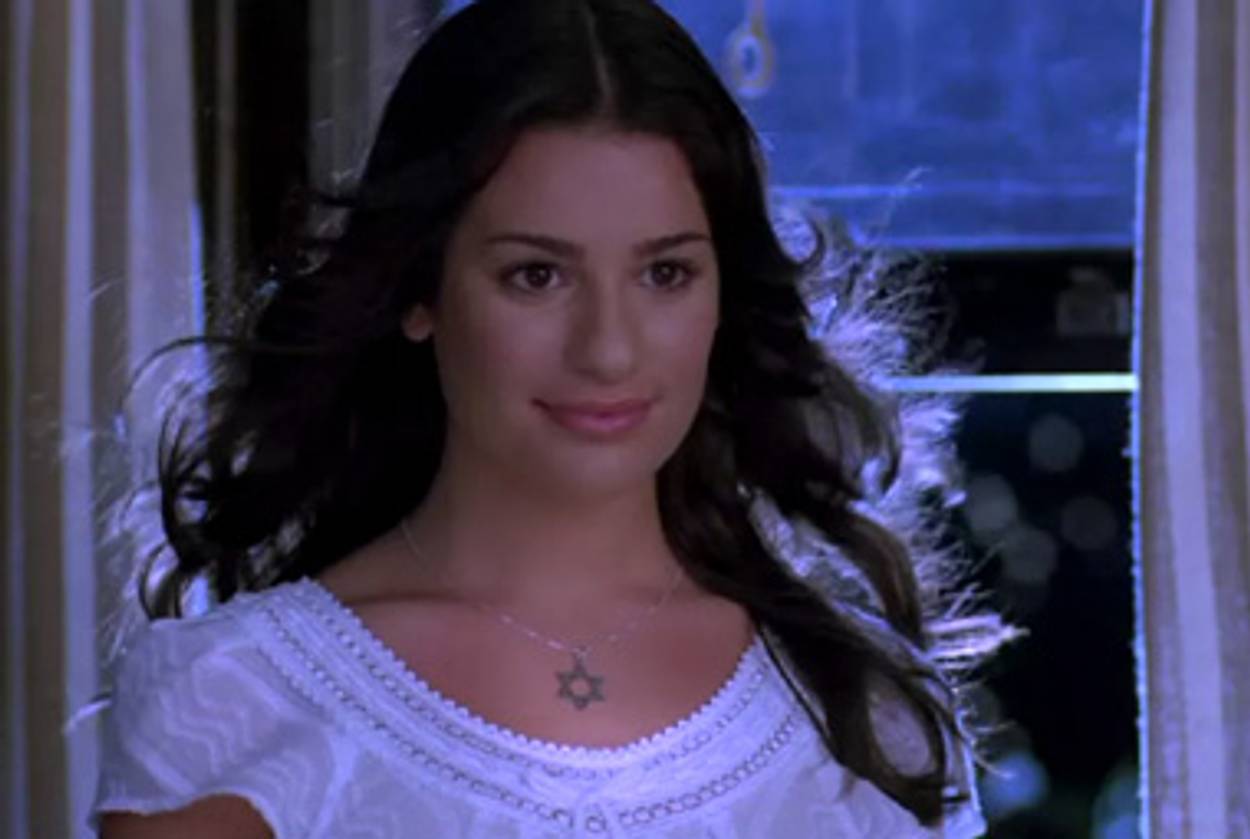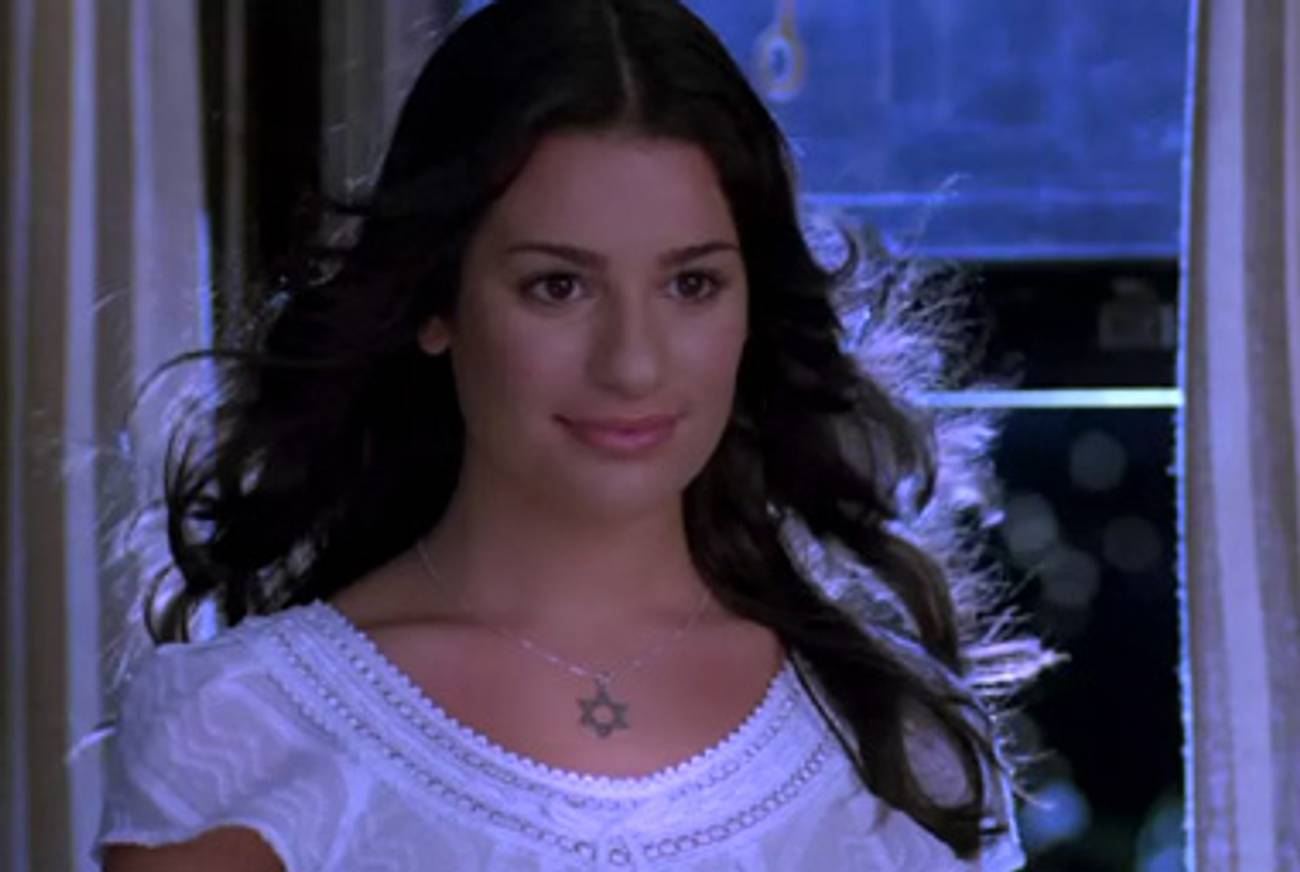The Outsiders
The Fox cult hit ‘Glee’ is about outcasts and Broadway—so naturally it offers a Jewish storyline




A high-school football player with a mohawk has a long, dark night of the soul. He dreams of an angelic visitation: a young woman in a nightgown, Star of David at her neck, wafts in through his window and gazes at him lovingly. As he awakes, he comes to the only reasonable conclusion: “Rachel was a hot Jew and the good Lord wanted me to get into her pants.” It must be said in all honesty, however, that this might not have been divine intervention; rather, like for Marley in A Christmas Carol, this visitation could have been the result of something the football player ate—the sweet-and-sour pork consumed during his family’s annual Simchat Torah’s viewing of Schindler’s List.
If you’re already watching Glee, the most bizarre, delirious, delightful show currently airing on network television, well, then, good for you. You already know what I’m talking about. Feel free to skip the rest of the column and set your DVR for tonight’s episode. If you’re not, I swear to you that millions of Americans watched these events last week, rubbed their eyes, and continued rubbing throughout the episode as this rugged football player, Noah, paid court to Rachel by singing a Neil Diamond song. Later, after the brief relationship soured, Noah looked mournfully into space and then contemplatively perched a yarmulke on top of his mohawk. This all took place, it should be repeated, on network television—indeed, on Fox.
Glee is the brainchild of Ryan Murphy, who created Nip/Tuck. That previous show featured two non-Jewish plastic surgeons in Miami—an unlikely possibility, to say the least—so one might be forgiven for assuming that his new cult hit, which revolves around a cast of singing and dancing misfits in an Ohio high school that’s stocked with your usual John Hughes-ful of jocks and cheerleaders, would have very little to do with matters Jewish.
One might be forgiven, but one would be wrong. Some of this, I suppose, has to do with casting. The show’s charismatic female lead, Lea Michele (born Lea Michele Sarfati), who’s got a voice with enough power to supplant Middle East oil, has been playing Jewish roles for years: she was Tateh’s daughter in the original Broadway production of Ragtime and Shprintze, one of Tevye’s daughters, in the 2003 Broadway revival of Fiddler on the Roof. Lea’s ethnic looks clash nicely with the blond midwesterness of the “Cheerios,” the cheerleaders who serve as her ostensible rivals on Glee.
But there’s more than that.
The show is about misfits, and the ragged chorus that makes up the McKinley High School glee club is—and suffers a bit from being too much of—the “one in every category” sort: there’s an African American, an Asian American, a gay student, and a nerd in glasses who, to up the ante, is also in a wheelchair. In fact, without providing any spoilers, it’s fair to say that one of the show’s themes is that anyone—even the jocks—can be a misfit, a target for an unerringly aimed Slushee to the face. So if all these other minority groups are included, a Breakfast Club-like lesson in how outsiders become a community—presumably with a different ending—how could you leave out the Jews? They’re part of the story of minority America muscling their way, in their difference, to center stage, to the heart of American entertainment.
But it’s probably more than that, too. The show’s bones are in Broadway; and—in a truth espoused by William Goldman in his backstage classic The Season 40 years ago and more recently and pungently in Eric Idle’s score for Spamalot—you won’t succeed on Broadway if you don’t have any Jews. Jews are as much a part of the DNA of American musical theater—and, as such, of Glee—as, well, gay men. The episode in which the show’s flamboyantly gay character, Kurt, leads the football team to success by getting the players to dance to Beyonce’s “All the Single Ladies” (and then successfully comes out to his gruff father) is a sly suggestion of the real forces that make Glee move (and shake, and pop their hips, and do jazz hands). Why can’t a frustrated love story between two self-proclaimed hot Jews be next? It’s what the people who pack those seats on the Great White Way come to see.
Whether this’ll be the case in a much broader medium, of course, remains to be seen. It’s also an open question whether these stories will be occasional moments, relegated to the chorus behind the tales of Finn and Quinn, the singing quarterback and cheerleader. I tend to think not, though. Thankfully, we’ll have the chance to find out: a month ago, Glee became the first new fall series to get picked up for the full season.
Jeremy Dauber is a professor of Yiddish language, literature, and culture at Columbia University.
These articles are not currently attributed to anyone. We’re working on it!